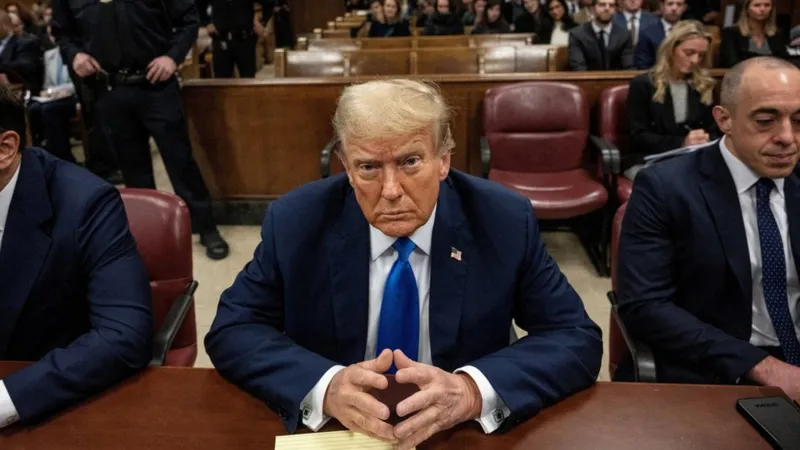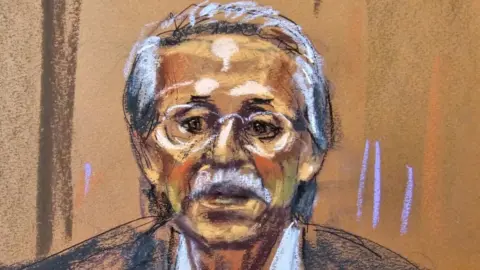News

The prosecution in Donald Trump's hush-money trial accused the former president of a criminal conspiracy and cover-up to hide a sex scandal ahead of the 2016 presidential election.
"It was election fraud, pure and simple," a lawyer told the jury during opening statements on Monday at the historic trial in New York.
Setting out the case for the defence, Mr Trump's lawyer said his client had committed no crimes and that it was not illegal to try to influence an election.
"He is cloaked in innocence," he added.
Mr Trump is accused of trying to cover up a $130,000 (£104,500) payment to porn star Stormy Daniels before he won the race for the White House back in 2016.
He has pleaded not guilty to 34 counts of falsifying business records and also denies having an alleged sexual encounter with Ms Daniels, whose real name is Stephanie Clifford.
At the start of the second week of the criminal trial in Manhattan - the first ever of a former US president - each side set out the case they will present to the jury. The first witness, tabloid publisher David Pecker, also took the stand briefly and will continue his testimony on Tuesday.
Prosecutor Matthew Colangelo told the court that Michael Cohen, Mr Trump's former lawyer and confidant, worked with the Trump Organization's chief financial officer, Allen Weisselberg, to "cook the books" at Mr Trump's direction.
Prosecutors alleged that the scheme to disguise how Cohen was reimbursed for the payment to Ms Daniels involved falsifying three forms of records - invoices, ledger entries and cheques.
Mr Trump said in his business records that those payments were "for legal services pursuant to a retainer agreement" with Mr Cohen, Mr Colangelo told the jury.
"Those were lies," the prosecutor said.
- What you need to know about Trump's hush-money trial
- Wildcard witness and untested legal theory: How strong is first Trump case?
- What the world makes of Trump going on trial
Critically for this case, he said that Mr Trump was motivated to provide the payoff so voters did not learn of the alleged encounter with Ms Daniels.
Prosecutors said that this cover-up should be considered election interference, which constituted a second crime. That elevated the charge of falsifying business records from a lower-level misdemeanour into a more serious felony.
They claimed the infamous Access Hollywood tape, which surfaced weeks before the 2016 election and showed Mr Trump bragging about being able to have sex with anyone because he is famous, had panicked his campaign.
"The defendant and his campaign staff were deeply concerned that it would irreparably damage his standing with female voters in particular," Mr Colangelo told the court.
But when Ms Daniels came forward a day later alleging a sexual encounter with Mr Trump, it compounded the problem created by the tape, Mr Colangelo alleged.
 Reuters
Reuters
Tabloid publisher David Pecker testified against his long-time friend
The public disclosure "would have been devastating to his campaign, so at Trump's direction Cohen negotiated a deal", Mr Colangelo told the jurors. The prosecution alleges Mr Pecker - the former boss at American Media Inc, which owns the National Enquirer - and Mr Cohen discussed how to keep it quiet.
The defence's rebuttal was fairly simple in comparison.
Mr Blanche appeared intent on casting prosecutors' star witness - Cohen - as an untrustworthy former employee with an axe to grind against the former president.
"He's a convicted felon and a convicted perjurer - he's an admitted liar," Mr Blanche said of Cohen.
He also zeroed in on Ms Daniels, who he said had earned "hundreds of thousands" of dollars with her claims. The defence lawyer told the jury to discount her as a witness.
He went on to dismiss the examples of allegedly false records as "34 pieces of paper" that did not involve his client.
As for the case prosecutors made for election interference, Mr Blanche denied that his client had done anything illegal even if he had attempted to sway voters.
"There's nothing wrong with trying to influence an election," Mr Blanche said. "It's called democracy."
The trial is expected to last about another six weeks, but legal experts say opening statements are particularly important as an opportunity to shape jurors' views on the case.
"You need to start out strong in a case like this," former federal prosecutor Neama Rahmani told the BBC.
Mr Rahmani noted that the prosecution's efforts to elevate this to an election interference case may be tough with a jury that includes two lawyers.
"It's clear the records were false business records, but to take that next step to prove they were in furtherance of, or to cover up, a campaign finance contribution, is a more difficult legal argument and they're going to need to do a lot more than that in my opinion.
"This is going to come down to Michael Cohen," he concluded, and whether his testimony backs up what he has said in the past and whether he has documents to prove it.
Additional reporting by Sam Cabral














